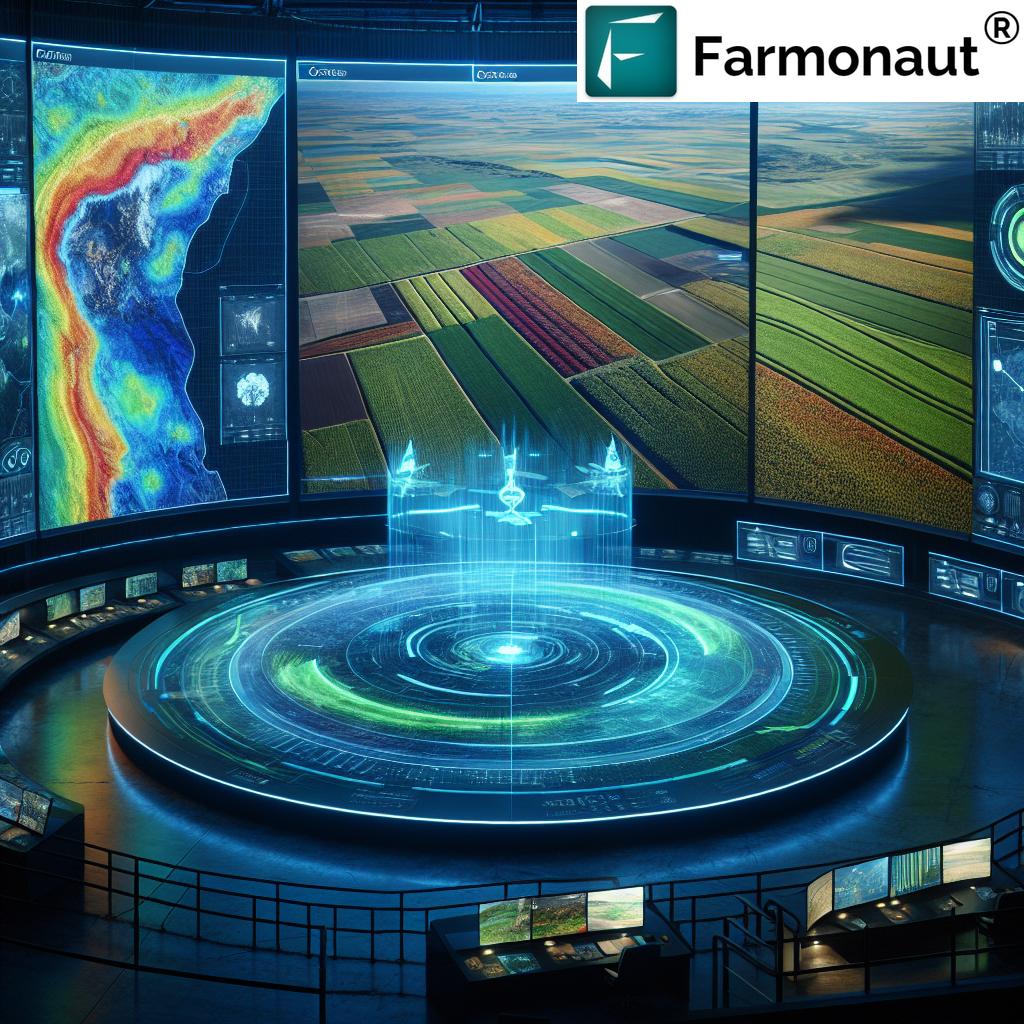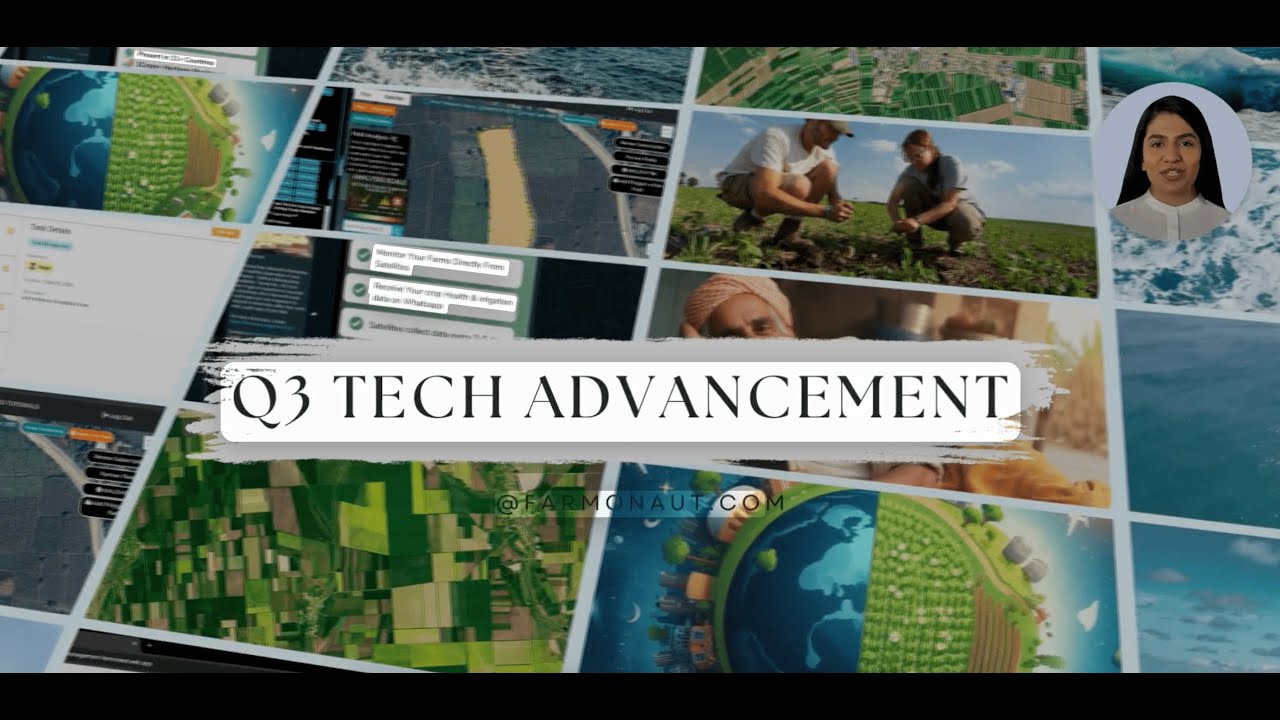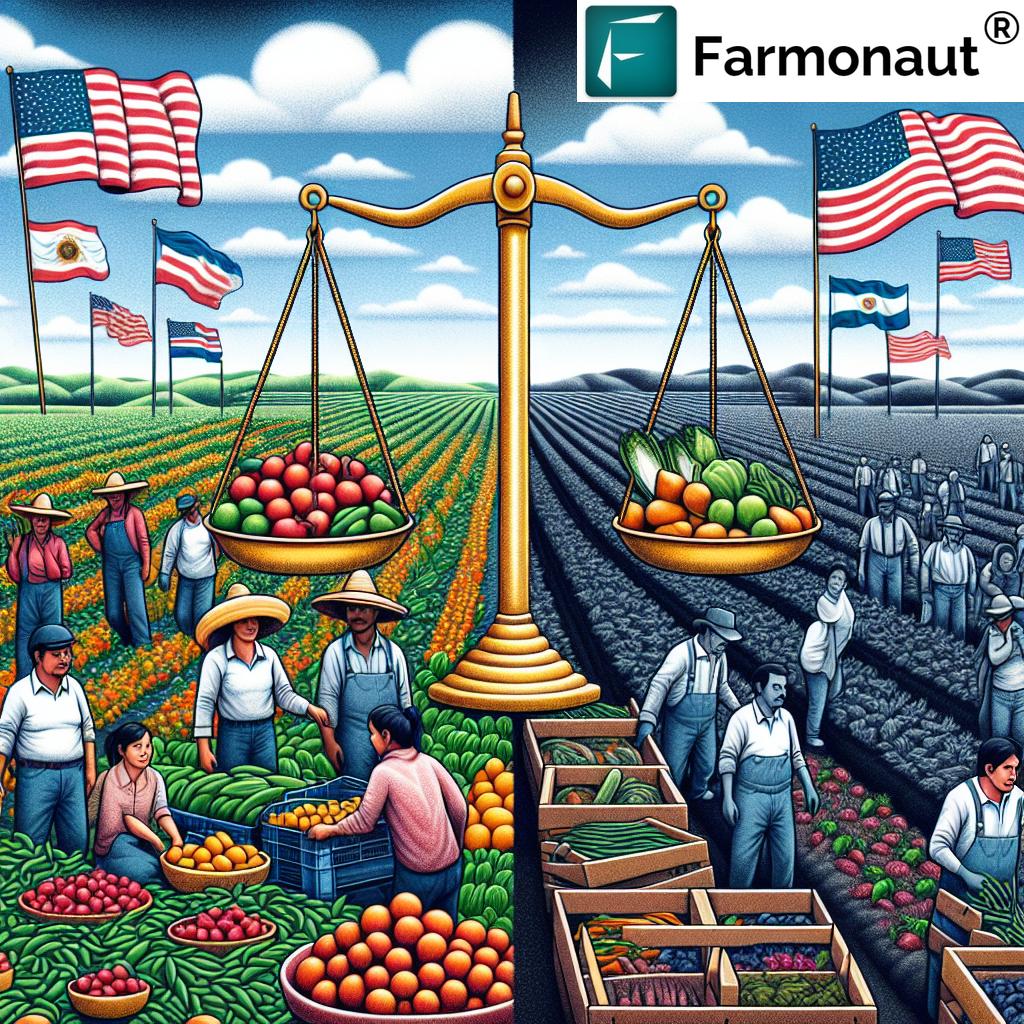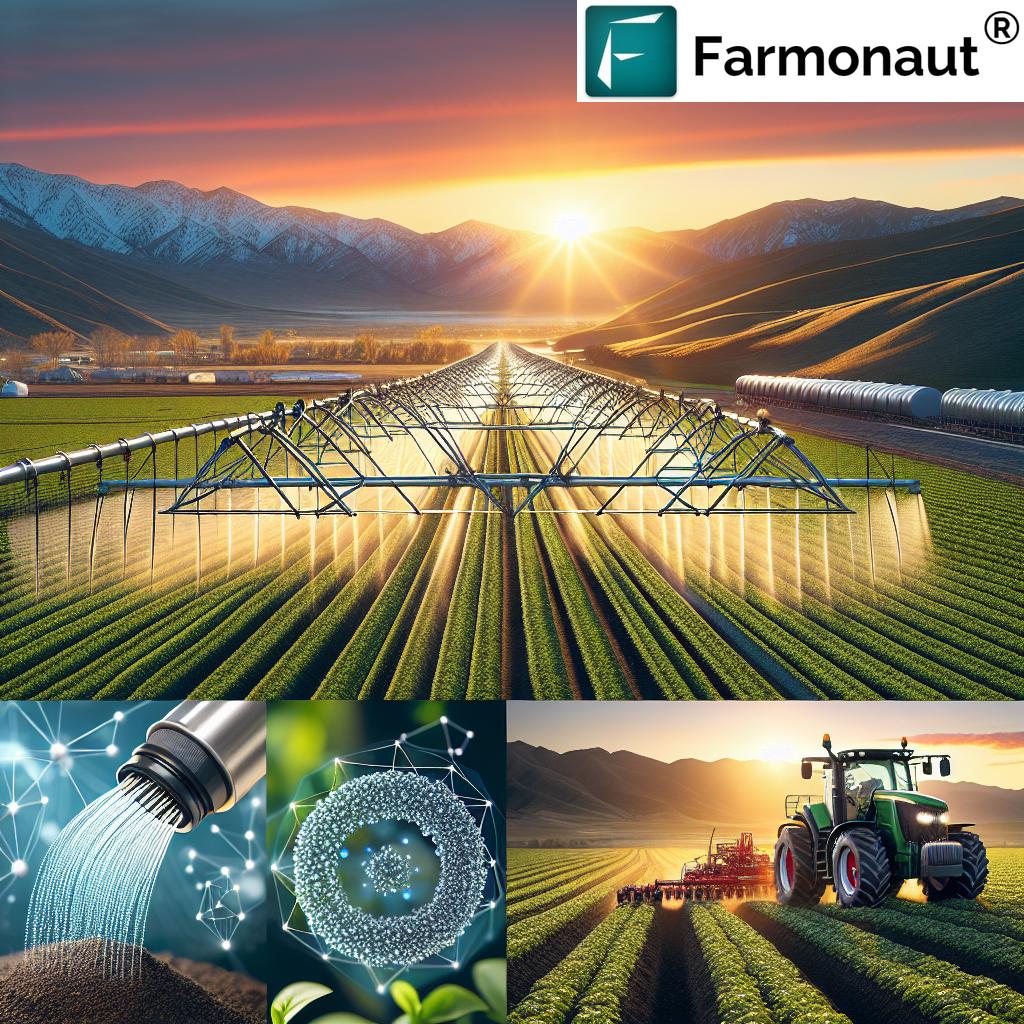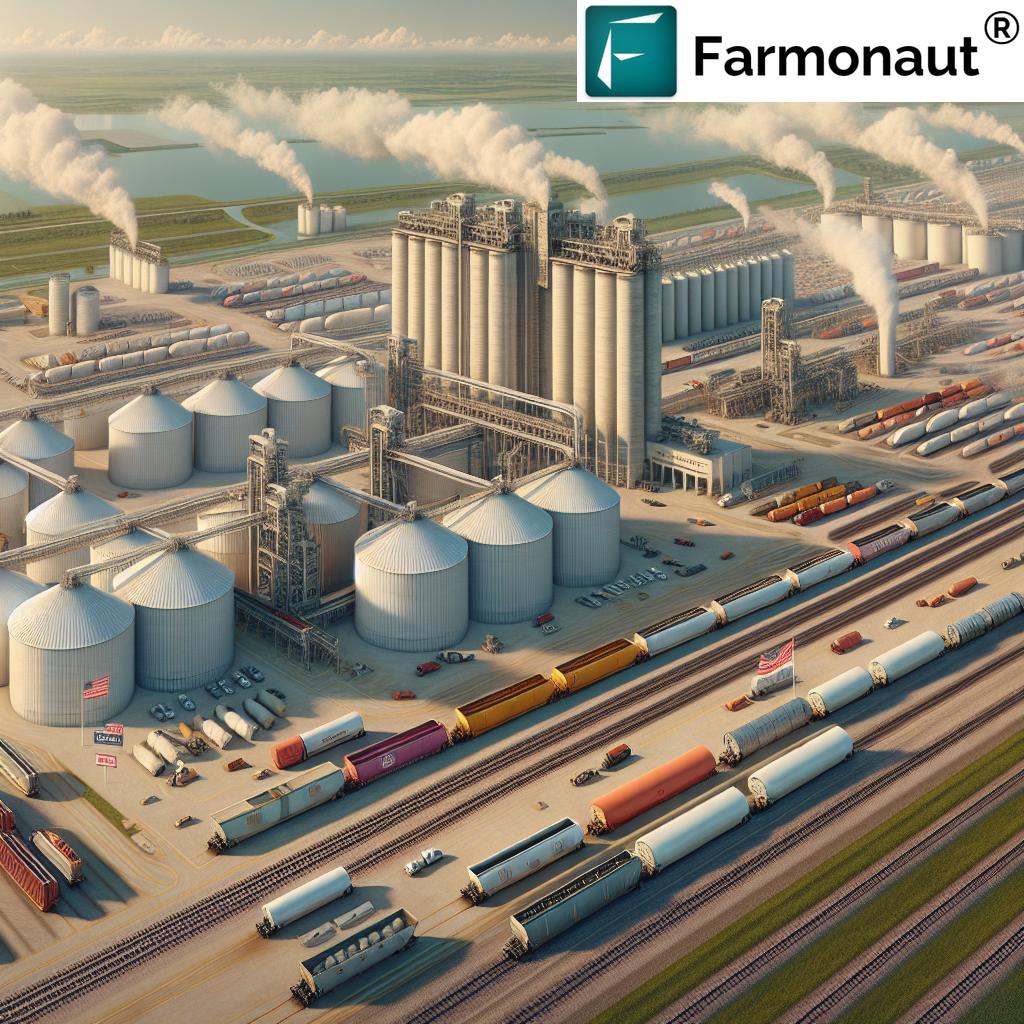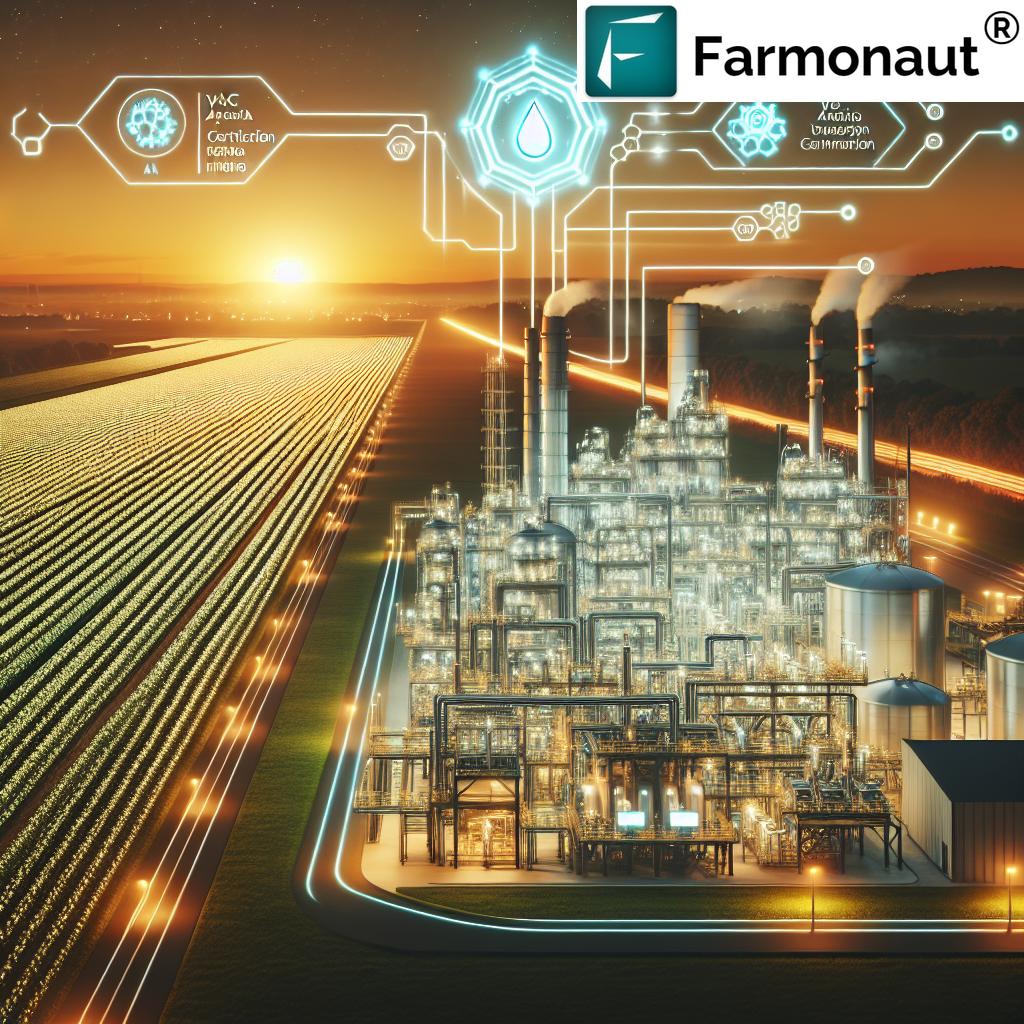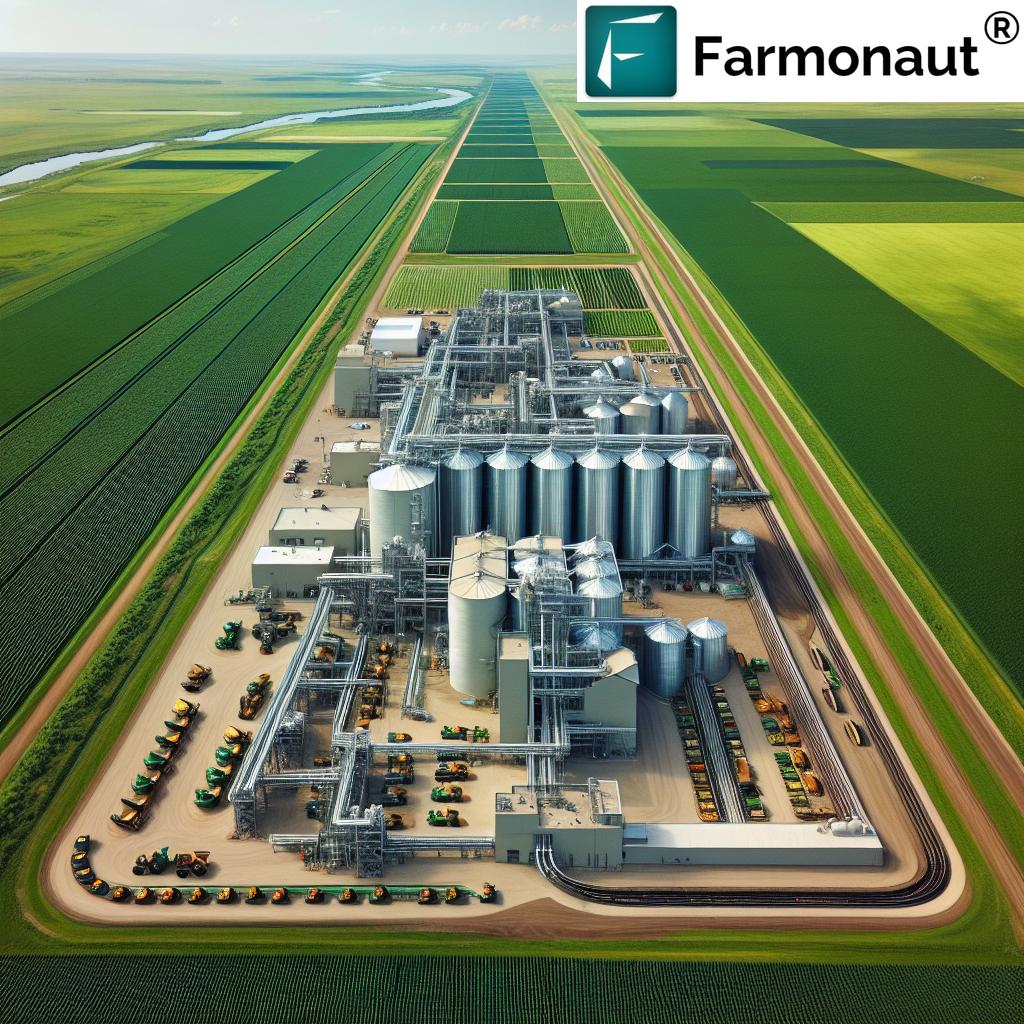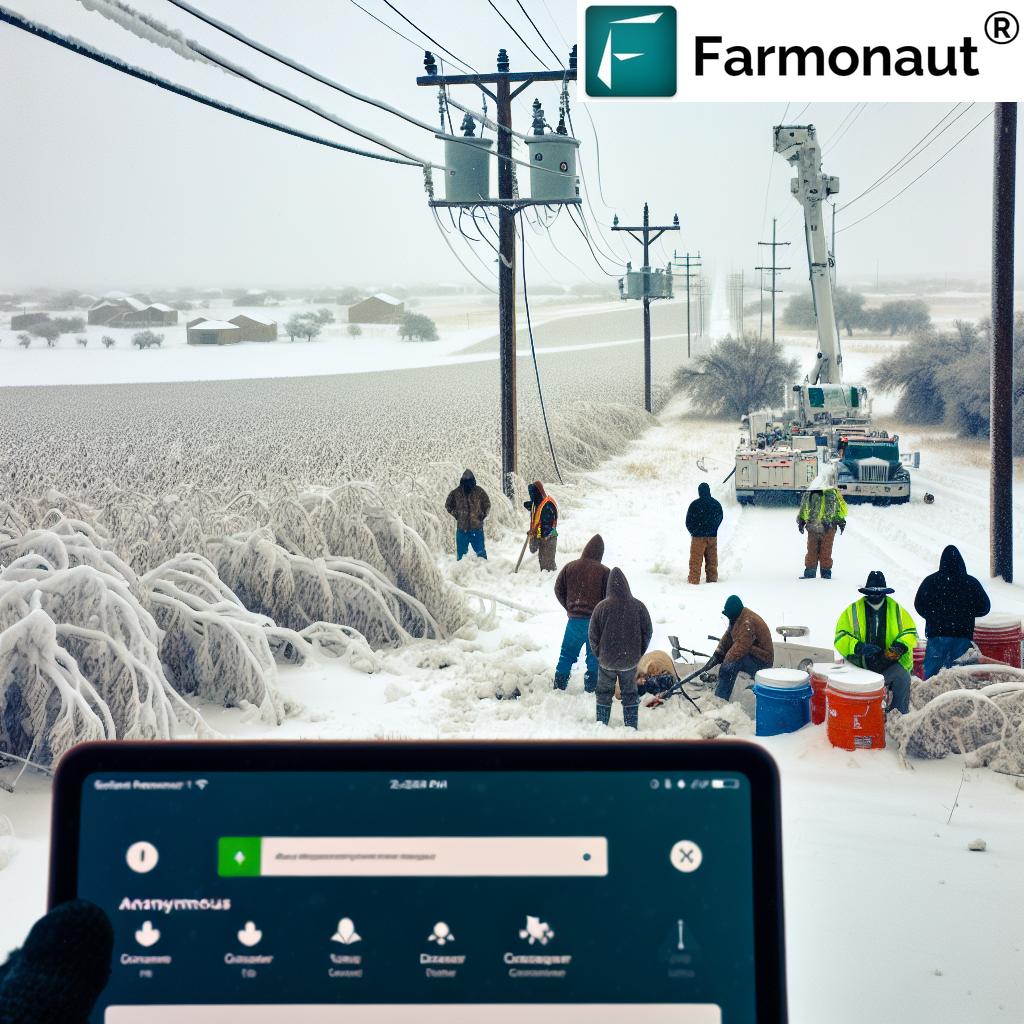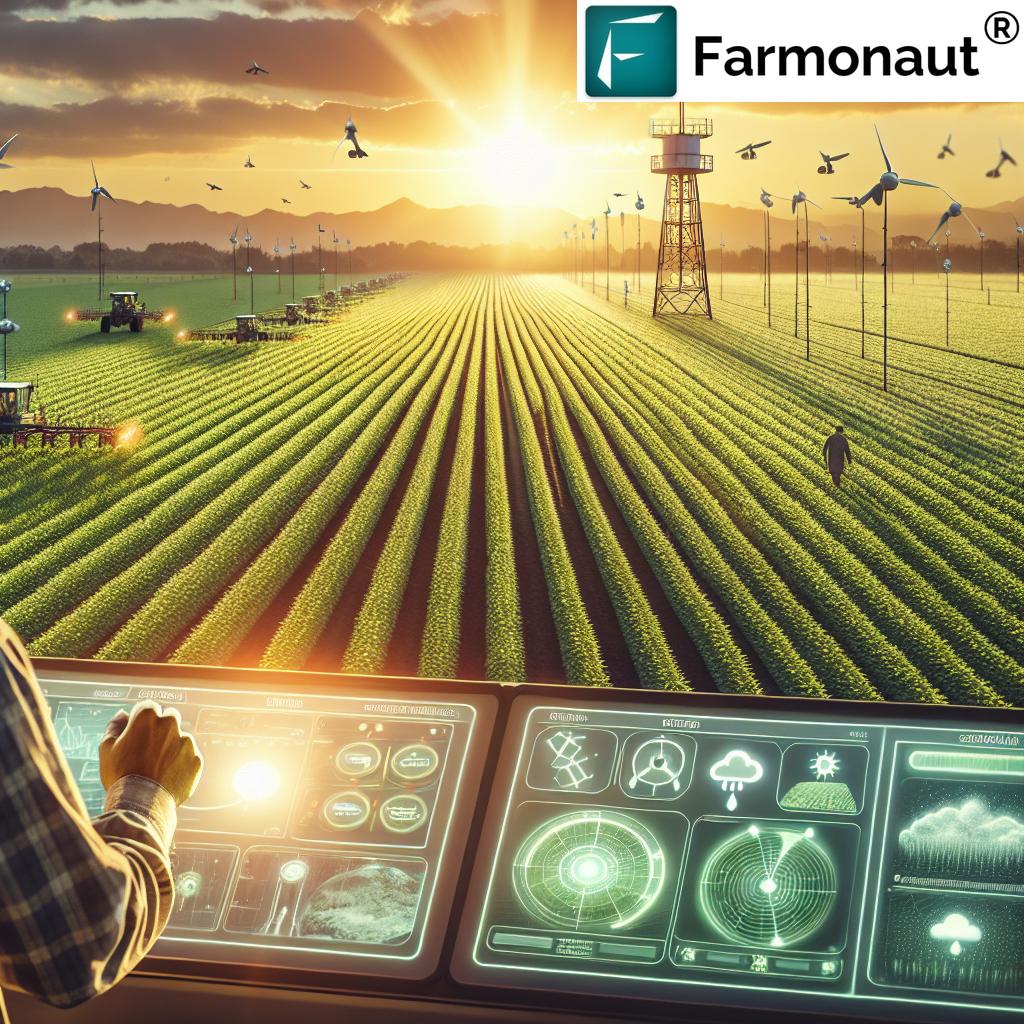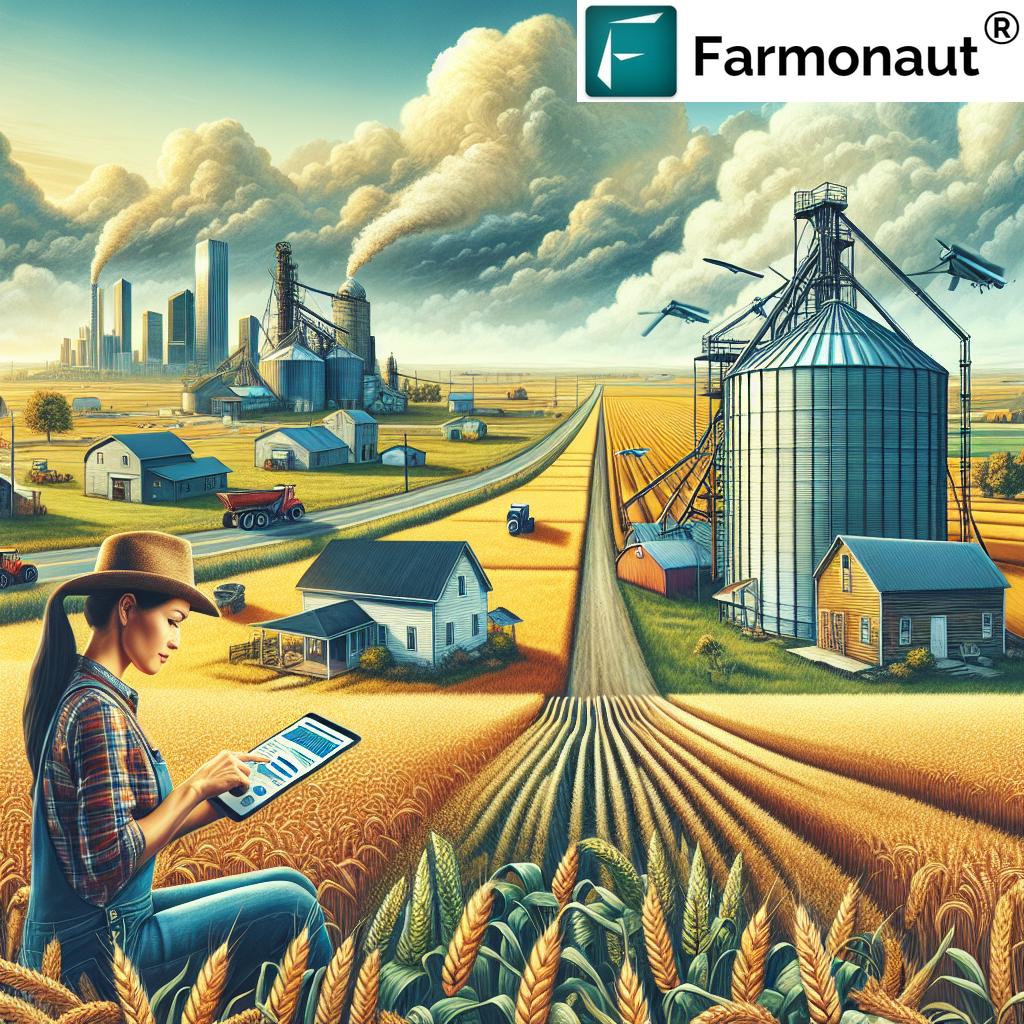Revolutionizing Agriculture: How Farmonaut’s AI and Satellite Technology Boost Precision Farming in the United States
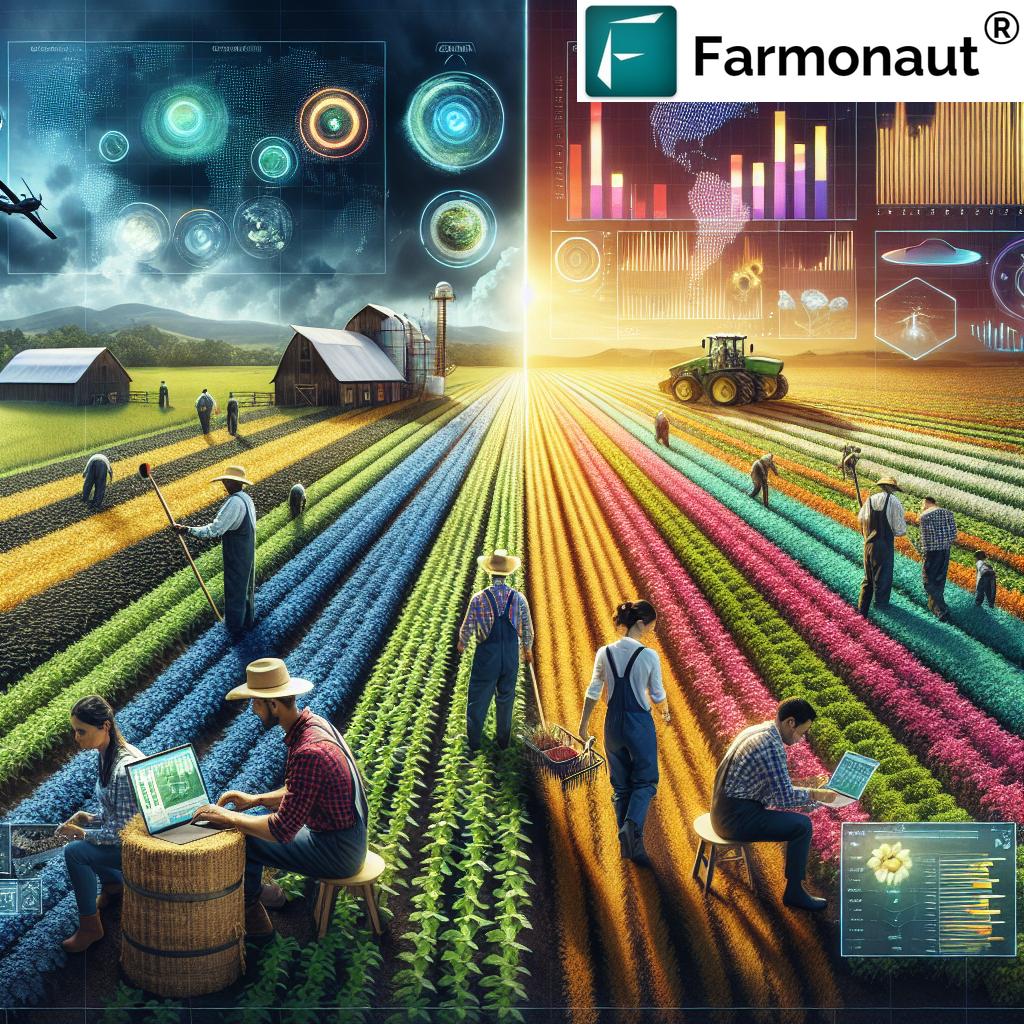
“Farmonaut’s AI-powered satellite technology has increased crop yields by up to 30% for precision farmers in the United States.”
In the heart of America’s agricultural landscape, a revolution is taking place. As we delve into the world of precision farming, we’re witnessing a transformative era where artificial intelligence (AI) and satellite technology are reshaping the way we cultivate our lands. At the forefront of this agricultural renaissance is Farmonaut, a pioneering company that’s harnessing the power of advanced technology to boost farming efficiency and sustainability across the United States.
In this comprehensive exploration, we’ll uncover how Farmonaut’s innovative solutions are addressing the challenges faced by modern farmers, from crop monitoring to resource management. We’ll examine the latest agricultural technology trends, dive deep into precision farming solutions, and showcase how smart farming techniques are driving sustainable agriculture practices forward.
The Dawn of Digital Agriculture
The agricultural sector is undergoing a significant transformation, driven by the integration of digital technologies. This shift towards digital agriculture is not just a trend; it’s a necessity in the face of growing global food demand, climate change, and resource scarcity. Farmonaut stands at the vanguard of this movement, offering cutting-edge digital agriculture solutions that are reshaping the farming landscape in the United States.
- Satellite Imagery for Agriculture: One of the cornerstones of Farmonaut’s approach is the utilization of satellite imagery for precise crop monitoring. This technology allows farmers to gain a bird’s-eye view of their fields, providing invaluable insights into crop health, soil conditions, and potential issues before they become visible to the naked eye.
- AI in Agriculture: Farmonaut’s implementation of AI in agriculture goes beyond simple data collection. Their advanced algorithms analyze satellite data, weather patterns, and historical crop information to provide actionable insights and predictive analytics.
- Remote Sensing in Farming: Through remote sensing applications, Farmonaut enables farmers to monitor vast areas of land efficiently, identifying variations in crop health, moisture levels, and even pest infestations without the need for time-consuming field walks.
These technological advancements are not just impressive on paper; they’re making a real difference in the fields. By leveraging these tools, farmers across the United States are seeing significant improvements in crop yields, resource efficiency, and overall farm management.
Farmonaut’s AI-Driven Precision Farming Solutions
Farmonaut’s suite of precision farming solutions is designed to address the multifaceted challenges of modern agriculture. By integrating AI, satellite technology, and data analytics, Farmonaut provides farmers with a comprehensive toolkit for optimizing their operations.
Crop Monitoring Systems
At the heart of Farmonaut’s offering is its advanced crop monitoring system. This system utilizes high-resolution satellite imagery to provide farmers with real-time data on crop health, growth patterns, and potential issues. Here’s how it works:
- Daily Satellite Imagery: Farmonaut’s platform receives daily updates from satellite partners, ensuring that farmers have the most current information about their fields.
- Vegetation Health Analysis: Using specialized algorithms, the system analyzes the imagery to assess vegetation health indices, such as NDVI (Normalized Difference Vegetation Index).
- Early Problem Detection: By identifying anomalies in crop health patterns, the system can alert farmers to potential issues like pest infestations or nutrient deficiencies before they become visible to the naked eye.
This level of monitoring allows for proactive management, enabling farmers to address problems swiftly and minimize crop losses.
Smart Farming Techniques
Farmonaut’s platform goes beyond monitoring to offer smart farming techniques that optimize resource use and improve decision-making:
- Precision Irrigation: By analyzing soil moisture data and weather forecasts, Farmonaut’s system can recommend optimal irrigation schedules, helping farmers conserve water while ensuring crops receive adequate hydration.
- Fertilizer Optimization: The platform provides insights on soil nutrient levels, allowing for targeted fertilizer application that reduces waste and improves crop nutrition.
- Yield Prediction: Using historical data and current crop health information, Farmonaut’s AI can predict potential yields, helping farmers make informed decisions about harvesting and market strategies.
These smart farming techniques not only improve efficiency but also contribute to more sustainable agriculture practices by reducing resource waste and environmental impact.
The Impact of Farmonaut’s Technology on U.S. Agriculture
The adoption of Farmonaut’s technology is having a profound impact on agriculture across the United States. Let’s explore some of the key areas where this impact is most evident:
Boosting Crop Yields
One of the most significant benefits of Farmonaut’s precision farming solutions is the potential for increased crop yields. By providing farmers with detailed insights into their crops’ health and needs, Farmonaut enables more targeted interventions that can lead to substantial yield improvements.
- Early Issue Detection: Farmonaut’s satellite imagery and AI analysis can identify potential problems such as pest infestations or nutrient deficiencies weeks before they become visible to the naked eye, allowing for early intervention.
- Optimized Resource Application: With precise data on soil conditions and crop health, farmers can apply water, fertilizers, and pesticides exactly where and when they’re needed, maximizing their effectiveness.
- Data-Driven Decision Making: Access to historical and real-time data enables farmers to make more informed decisions about planting times, crop rotations, and harvesting schedules.
“Satellite imagery in agriculture has grown by 150% in the last 5 years, revolutionizing crop monitoring and management.”
Enhancing Sustainability
Farmonaut’s technology is not just about increasing yields; it’s also playing a crucial role in promoting sustainable agriculture practices:
- Water Conservation: Precision irrigation recommendations help farmers use water more efficiently, reducing waste and conserving this precious resource.
- Reduced Chemical Usage: By enabling targeted application of fertilizers and pesticides, Farmonaut’s system helps minimize chemical runoff and its environmental impact.
- Soil Health Preservation: Data-driven insights into soil conditions allow farmers to implement practices that maintain and improve soil health over time.
These sustainable practices not only benefit the environment but also contribute to long-term farm profitability by preserving resources and reducing input costs.
Empowering Small and Medium-Sized Farms
One of the most significant impacts of Farmonaut’s technology is its potential to level the playing field for small and medium-sized farms in the United States:
- Affordable Access to Advanced Technology: Farmonaut’s subscription-based model makes precision farming tools accessible to farms of all sizes, not just large agricultural corporations.
- Increased Competitiveness: By optimizing their operations, smaller farms can compete more effectively with larger entities, potentially increasing their market share and profitability.
- Knowledge Empowerment: The insights provided by Farmonaut’s platform help farmers make data-driven decisions, reducing reliance on guesswork and tradition.
This democratization of technology is crucial for maintaining a diverse and resilient agricultural sector in the United States.
The Future of Farming: Agritech Investment Opportunities
As we look to the future of agriculture, it’s clear that technology will play an increasingly vital role. This transition presents significant agritech investment opportunities for those looking to be part of the agricultural revolution:
- Growing Market: The global agricultural technology market is expected to reach $22.5 billion by 2025, with a compound annual growth rate of 9.8%.
- Diverse Investment Options: From AI and machine learning to drone technology and IoT sensors, there are numerous areas within agritech ripe for investment.
- Potential for High Returns: As agritech solutions prove their value in increasing yields and efficiency, early investors in successful technologies stand to see significant returns.
For those interested in exploring these opportunities, platforms like Farmonaut offer a glimpse into the potential of agritech investments. By understanding the technology and its applications, investors can make informed decisions about where to allocate their resources in this growing sector.
Comparison: Traditional vs. Farmonaut’s AI-Powered Approach
| Aspect | Traditional Farming | Farmonaut’s AI-Powered Approach |
|---|---|---|
| Crop Monitoring Frequency | Weekly manual inspections | Daily satellite imagery analysis |
| Data Accuracy | Moderate, subject to human error | High, based on precise satellite data and AI analysis |
| Resource Optimization | Based on general guidelines and experience | Data-driven, tailored to specific field conditions |
| Yield Prediction | Estimates based on historical data and visual inspection | AI-powered predictions using multiple data points |
| Sustainability Impact | Variable, often leading to overuse of resources | High, with precise resource application reducing waste |
Implementing Farmonaut’s Solutions: A Step-by-Step Guide
For farmers looking to integrate Farmonaut’s technology into their operations, here’s a step-by-step guide to get started:
- Sign Up for an Account: Visit Farmonaut’s website and create an account. You can choose from various subscription options based on your farm size and needs.
- Define Your Fields: Use the platform’s mapping tool to outline your fields. This allows the system to focus on your specific areas of interest.
- Set Up Crop Types: Input information about the crops you’re growing in each field. This helps the AI tailor its analysis to your specific crops.
- Connect Weather Stations: If you have local weather stations, integrate them with the Farmonaut platform for more accurate local weather data.
- Begin Monitoring: Once set up, you’ll start receiving daily updates on your crops’ health, soil conditions, and other relevant metrics.
- Analyze Insights: Regularly review the insights and recommendations provided by the platform. Use this information to guide your farming decisions.
- Implement Changes: Based on Farmonaut’s recommendations, make adjustments to your irrigation, fertilization, and pest management strategies.
- Track Progress: Use the platform’s reporting tools to track the impact of your changes over time, continually refining your approach for optimal results.
By following these steps, farmers can leverage the full power of Farmonaut’s AI and satellite technology to transform their agricultural practices.
The Role of AI in Shaping the Future of Agriculture
Artificial Intelligence is not just a buzzword in agriculture; it’s a transformative force that’s reshaping the entire industry. Farmonaut’s implementation of AI in its precision farming solutions exemplifies how this technology can address some of the most pressing challenges in modern agriculture:
- Predictive Analytics: AI algorithms can analyze vast amounts of data to predict crop yields, pest outbreaks, and optimal harvesting times with unprecedented accuracy.
- Automated Decision Support: AI-powered systems can provide farmers with real-time recommendations for irrigation, fertilization, and pest control, taking into account numerous variables that would be impossible for a human to process simultaneously.
- Pattern Recognition: AI excels at identifying patterns in crop health, soil conditions, and weather data, enabling early detection of potential issues before they become serious problems.
- Resource Optimization: By analyzing historical data and current conditions, AI can help farmers optimize their use of water, fertilizers, and pesticides, reducing waste and environmental impact.
Farmonaut’s AI-driven approach is at the forefront of this agricultural revolution, providing farmers with tools that were once the stuff of science fiction. As AI continues to evolve, we can expect even more sophisticated applications that will further enhance agricultural productivity and sustainability.
The Economic Impact of Precision Farming in the United States
The adoption of precision farming technologies like those offered by Farmonaut is having a significant economic impact on the U.S. agricultural sector:
- Increased Profitability: By optimizing resource use and improving yields, precision farming can significantly boost farm profitability. Studies have shown that precision agriculture can increase net returns by up to $25 per acre for corn and $11 per acre for soybeans.
- Job Creation: The growth of the agritech sector is creating new job opportunities in fields such as data analysis, software development, and precision agriculture consulting.
- Rural Economic Development: As farms become more profitable and technologically advanced, they can contribute to the economic revitalization of rural communities.
- Export Competitiveness: By producing crops more efficiently and sustainably, U.S. farmers can maintain their competitive edge in global markets.
These economic benefits underscore the importance of continued investment in and adoption of precision farming technologies across the United States.
Overcoming Challenges in Precision Agriculture Adoption
While the benefits of precision agriculture are clear, there are still challenges to widespread adoption. Farmonaut and other industry leaders are working to address these issues:
- Initial Investment Costs: The upfront costs of adopting new technologies can be a barrier for some farmers. Farmonaut addresses this by offering scalable, subscription-based solutions that don’t require significant hardware investments.
- Technical Knowledge Gap: Many farmers may feel overwhelmed by the technical aspects of precision farming. Farmonaut provides user-friendly interfaces and comprehensive support to help farmers navigate these new technologies.
- Data Privacy Concerns: As farming becomes more data-driven, concerns about data ownership and privacy have emerged. Farmonaut prioritizes data security and transparency in its operations.
- Connectivity Issues: Rural areas often lack the robust internet connectivity needed for some precision farming tools. Farmonaut’s satellite-based approach helps mitigate this issue, providing valuable insights even in areas with limited connectivity.
By addressing these challenges head-on, Farmonaut is helping to pave the way for broader adoption of precision farming technologies across the United States.
The Global Context: How U.S. Precision Farming Compares
While the United States is at the forefront of precision farming adoption, it’s important to consider the global context:
- Global Leaders: Countries like Israel, the Netherlands, and Australia are also making significant strides in precision agriculture. The U.S. can learn from and collaborate with these nations to further advance the field.
- Developing Markets: There’s growing interest in precision farming technologies in developing countries, where they have the potential to significantly boost food security and economic development.
- International Collaboration: Companies like Farmonaut are well-positioned to facilitate knowledge sharing and technology transfer on a global scale, helping to address worldwide agricultural challenges.
By understanding the global landscape, U.S. farmers and agribusinesses can stay competitive and contribute to solving global food security challenges.
The Road Ahead: Future Trends in Precision Agriculture
As we look to the future, several emerging trends are likely to shape the evolution of precision agriculture:
- Integration of IoT Devices: The Internet of Things (IoT) will play an increasingly important role in agriculture, with sensors providing real-time data on soil conditions, crop health, and weather patterns.
- Advanced Robotics: Autonomous robots and drones will become more prevalent for tasks like planting, harvesting, and crop monitoring.
- Blockchain for Traceability: Blockchain technology will enhance supply chain transparency and food safety by providing immutable records of crop origins and processing.
- Personalized Crop Varieties: AI and genetic engineering will enable the development of crop varieties tailored to specific local conditions and climate challenges.
Farmonaut is well-positioned to incorporate these emerging technologies into its platform, ensuring that U.S. farmers have access to the most advanced precision farming tools available.
Conclusion: Embracing the Agricultural Revolution
As we’ve explored throughout this article, the integration of AI and satellite technology in agriculture, exemplified by Farmonaut’s innovative solutions, is revolutionizing farming practices across the United States. From boosting crop yields and enhancing sustainability to empowering small farms and creating new economic opportunities, the impact of precision farming is far-reaching and profound.
The journey towards fully embracing these technologies is not without its challenges, but the potential benefits for farmers, consumers, and the environment are immense. As we look to the future, it’s clear that precision agriculture will play a crucial role in addressing global food security challenges while promoting sustainable and efficient farming practices.
For farmers, agribusinesses, and investors alike, now is the time to engage with these transformative technologies. By leveraging platforms like Farmonaut, stakeholders in the agricultural sector can position themselves at the forefront of this agricultural revolution, driving innovation and shaping the future of farming in the United States and beyond.
As we conclude, it’s worth reiterating that the adoption of precision farming technologies is not just about improving individual farm operations; it’s about fostering a more resilient, sustainable, and productive agricultural sector that can meet the challenges of the 21st century. The revolution is here, and with companies like Farmonaut leading the way, the future of agriculture looks brighter than ever.
FAQ Section
Q: What is precision farming, and how does Farmonaut contribute to it?
A: Precision farming is an agricultural management concept that uses technology to observe, measure, and respond to variability in crops. Farmonaut contributes by providing AI-powered satellite imagery analysis and data-driven insights to help farmers make precise decisions about crop management.
Q: How does Farmonaut’s technology improve crop yields?
A: Farmonaut’s technology improves crop yields by providing early detection of issues like pest infestations or nutrient deficiencies, enabling targeted resource application, and offering data-driven insights for optimal planting and harvesting decisions.
Q: Is Farmonaut’s technology suitable for small farms?
A: Yes, Farmonaut’s subscription-based model makes its technology accessible to farms of all sizes, including small and medium-sized operations.
Q: How does Farmonaut’s approach contribute to sustainable agriculture?
A: Farmonaut promotes sustainable agriculture by optimizing resource use, reducing chemical runoff through targeted application, and providing insights that help preserve soil health.
Q: What kind of return on investment can farmers expect from implementing Farmonaut’s solutions?
A: While exact ROI can vary, farmers using precision agriculture technologies like Farmonaut’s have reported increased net returns of up to $25 per acre for corn and $11 per acre for soybeans.
API: https://sat.farmonaut.com/api
API Developer Docs: https://farmonaut.com/farmonaut-satellite-weather-api-developer-docs/
